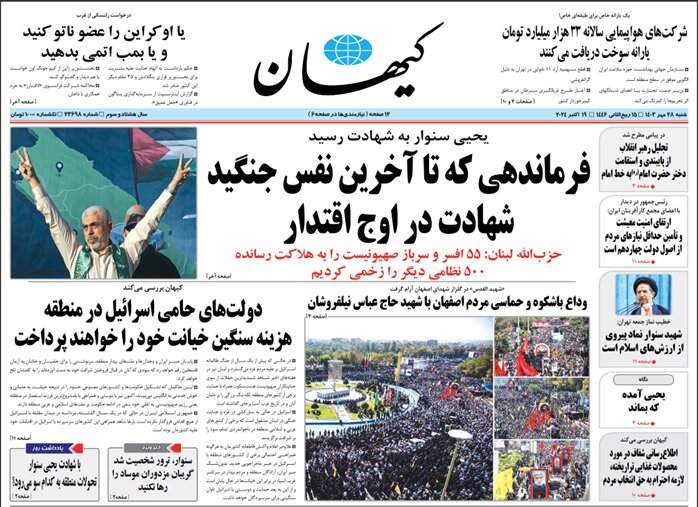Iran’s patience may be running thin

TEHRAN- In a commentary, Kayhan dealt with the silence and even support by some regional countries for Israel's crimes.
It wrote: Israel is engaged in genocide in Gaza and war crimes in Lebanon, while some Arab and Islamic countries in the region are preferring profit over honor. The Islamic Republic of Iran has repeatedly witnessed the cooperation of these countries with Israel in their actions against the Axis of Resistance and our country. Iran declared that it would react decisively to any new and possible cooperation of some regional countries with Israel in any new adventure. Undoubtedly, the patience of Iran, the free people of the region, and the awakened people throughout West Asia are running out against these betrayals, and from now on, support and friendship with Israel will be costly for its supporters. They will determine a fate for the traitors of the Palestinian cause, which will turn the profit they have earned for selling their honor into a loss.
Iran: New psychological operation
In an analysis, the Iran newspaper discussed the new psychological operation by the Western media outlets about "Iran's revision of regional policies" and wrote: The anti-Zionist resistance was revived with Iran’s support and persisted, leading to the Al-Aqsa Storm. And after the October 7 of last year, it continues its path with strength. Propounding the idea that it is necessary for Iran to “revise regional policies" by some foreign media outlets show that the supporters of Israel are trying to leave a psychological effect on the current developments in the region to weaken the support of the Iranian public opinion for the Palestinian cause. The United States of America, rather than seeking to stop Israel's crimes in Gaza, seeks to maximize the interests of the Zionist regime. In this situation, proposing to change Iran's regional policies and conducting negotiations with America and Europe to thwart the Zionists' plan is pure naivety. Talking about the need for Iran to revise its regional policies, withdrawing support for the Palestinian resistance movement in fighting Israel and agreeing to the peace emphasized by the U.S. and the West, is a project that has been designed with the aim of soft destruction of the resistance.
Siasat-e-Rooz: Repeating the failed game
In an article, Siasat-e-Rooz discussed the West's hidden economic interests in repeating the failed game of ownership claims about three Iranian Islands in the Persian Gulf. It wrote: The West is seeking to incite a fire in the region to serve the Zionist regime by provoking the false claims by certain Arab countries about the territorial integrity of Iran. In the critical situation of the region, the countries of the Persian Gulf Cooperation Council have used the existing threats against Iran to promote their claims on the three Iranian islands. The change in position of the European countries regarding the three Iranian islands is due to their policy of passivity and blackmail in the face of the Zionist regime’s moves. The denial of reality by the countries of the Persian Gulf and the promotion of this illusion by the extra-regional countries may send petrodollars to European companies, but it will not meet the long-term benefits of any parties. The claim raised in the meeting of the Persian Gulf Cooperation Council and the European Union have faced harsh reactions by the Iranian authorities because the Lesser and Greater Tunb islands and Abu Musa are an inseparable part of the Iranian territory.
Ettelaat: Pezeshkian's scenario to resolve nuclear dispute
In an interview with Hossein Kanaani Moghaddam, a political activist, Ettelaat discussed the diplomatic performance of the sitting government. He said: The Pezeshkian government’s diplomatic behavior shows that it has serious will to restore the country's relationship with the world. If things are pursued rationally in tandem with national interests, it can increase the hope for reducing international limitations. However, the differences between Tehran and Europe regarding Iran's nuclear issue have been going on for more than a decade, and the effects of these differences are evident in Iran's political and economic areas. A good and effective event after the formation of the Pezeshkian government is that the Ministry of Foreign Affairs has shown a good dynamism in this short time of its life. Therefore, it proves that the government, knowing the complexities of Iran's relationship with the West, has made every effort to turn the interaction with the Persian Gulf neighbors into an opportunity to remove limitations. To pass through a period that is full of crises, it seems inevitable for Iran to restore its relationship with the West.
Leave a Comment